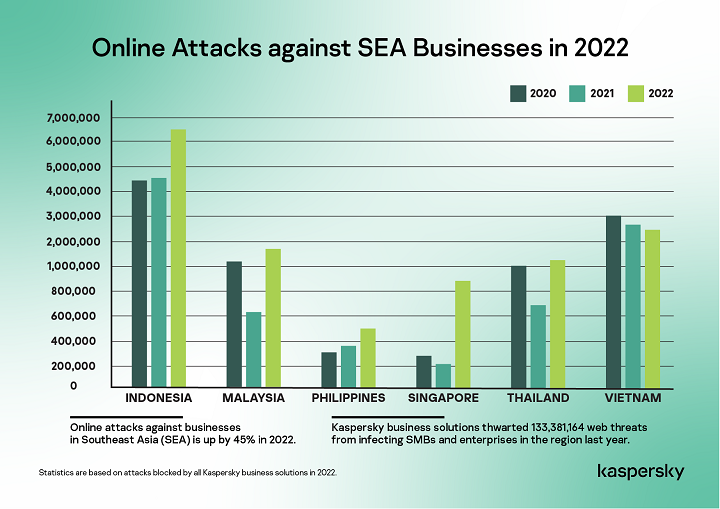2022 appears to be a busy year for cybercriminals targeting companies in Southeast Asia (SEA).
The latest data from Kaspersky shows a 45% jump in web threats blocked by the global cybersecurity company’s business solutions last year.
Web-based threats, or online threats, refer to attempts to download malicious objects from a malicious/infected website. Malicious websites are deliberately created by malicious users; infected sites include those with user-contributed content (such as forums), as well as compromised legitimate resources, Web threats are made possible by end-user vulnerabilities, web service developers/operators, or web services themselves. Regardless of intent or cause, the consequences of a web threat may damage both individuals and organizations.
During the peak of the pandemic in 2020, Kaspersky prevented 10,200,817 web attacks from infecting businesses in SEA. The number dipped slightly in 2021 at 9,180,344 and spiked yet again in 2022 at 13,338,164.
Singapore logged the highest year-over-year (YOY) jump in terms of web threats targeting businesses last year. The Southeast Asian country logged more than a three-fold spike (329%) after Kaspersky’s business solutions blocked a total of 889,093 web attacks, a whopping increase from 2021’s total of just 207,175 incidents.
The uptick was also observed across the four Southeast Asian countries – Malaysia (197%), Thailand (63%), Indonesia (46%), and the Philippines (29%).
Only Vietnam witnessed a slight dip (-12%) after recording only 2,485,168 web threat incidents last year as compared to 2021’s 2,822,591.

“Last year was a period of reopening for most businesses in Southeast Asia and, unfortunately, so as for cybercriminals. The Vietnam government has continuously pushed to beef up the cybersecurity defenses of the nation and the country’s local companies and it is encouraging to see that the efforts are translating into concrete results,” says Yeo Siang Tiong, General Manager for Southeast Asia at Kaspersky.
“The greater Southeast Asia region, however, needs more help in building their capabilities to protect their companies against cyberattacks. As 2023 will be the first year of fully re-opened borders and markets, we encourage companies here to allocate budget and resources to strengthen their defenses against the increasing attacks against their networks. While the IT security talent gap remains an issue, outsourcing experts and comprehensive solutions offer efficiencies that can fill in this missing piece,” adds Yeo.
How to protect your businesses against web threats
Most threats are successful due to two main weaknesses:
- Human error
- Technical error
Full protection from web threats means you will need to find ways to cover these weak points. As these web threats were targeted against enterprises, this means these are just the starting points of more complex cyberattacks.
Kaspersky experts suggest enterprises to build a consistent ongoing incident investigation and response processes, nurturing and supporting your IT security talent-base, and making the most of your time and resources.
To help businesses, the global cybersecurity company has launched its Kaspersky Extended Detection and Response (XDR) platform. This platform will equip in-house experts with all the advanced technologies, actionable threat intelligence, and technical skills they need to address complex and targeted cyberattacks.
It will also enrich your knowledge pool with threat intelligence and upskill your experts to deal with complex incidents and it can call upon external experts for assessment, immediate support and back-up in case of an attack.
Businesses can find out more about this new platform at go.kaspersky.com/expert
Kaspersky in Southeast Asia also has launched a Buy 1 Free 1 promo. Businesses can now enjoy two years of enterprise-grade endpoint protection for the price of 1 with Kaspersky Endpoint Security for Business or Cloud or Kaspersky Endpoint Detection and Response Optimum, with 24×7 phone support.

